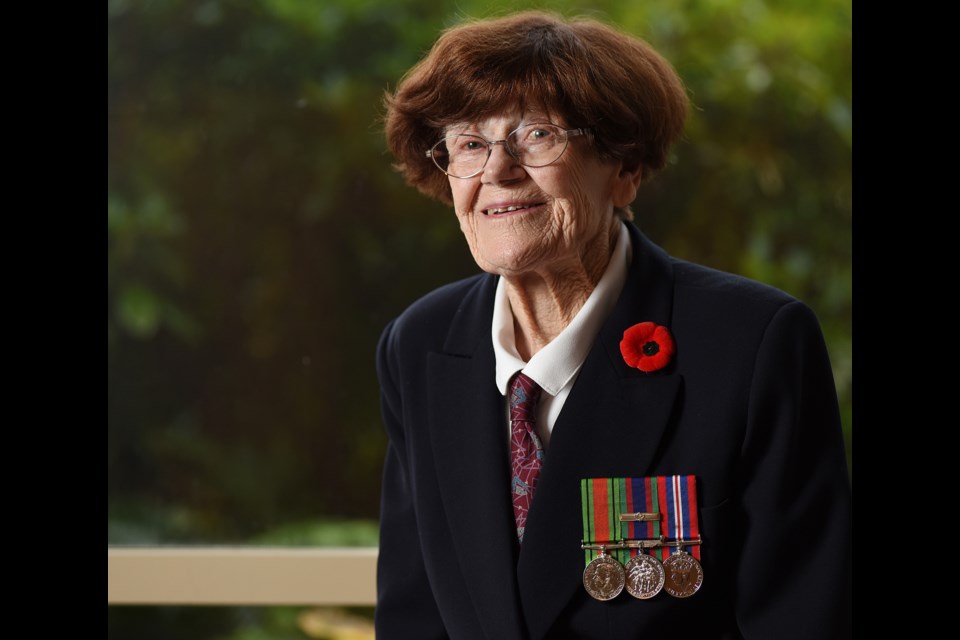Doris Gregory was stopped and interrogated 21 times as she and a friend made their way on bicycles from Dublin to Belfast during the Second World War. Having snuck into the Irish Republic on a nine-day leave from the Canadian Women’s Army Corps (CWAC), the pair was extremely relieved by the time they finally made it back to Northern Ireland.
“They were afraid of spies,” said Gregory, now 93 and living in Kitsilano, of the British who had declared the Irish Republic off limits to all but immediate relatives due to its neutral stance.
“We were cycling in the dark. We sounded like parrots [during the interrogations]. ‘My name is Jean White and I’m in the Canadian Women’s Army Corps.’ It was very stressful.
Then we got lost in the mountains so we ended up sneaking across twice. When we finally got to Belfast we had no place to stay. We stopped a Canadian Naval officer who sent us to the Grand Central Hotel. We were exhausted.”
But Gregory was also exhilarated.
“We weren’t in combat. We were young and adventurous.”
Gregory joined CWAC in 1942, after leaving the University of British Columbia where she had been studying psychology. A reporter at the university’s student newspaper, The Ubyssey, she had led a minor revolt against the male-only segregation of a mandatory second-year English course.
“[The professor] felt that there were certain things in English literature that couldn’t be discussed in mixed company,” Gregory said. Ultimately, she and 20 other young women marched into the class and were just as quickly marched out.
“The men booed as we went out.”
The Canadian University Press picked up the story and she found herself a minor celebrity. By the next year, however, fellow journalist Pierre Burton had graduated and she no longer found the newspaper atmosphere a pleasant one.
She learned about the CWAC, which, along with the Royal Canadian Air Force Women’s Division (RCAF WD) and the Women’s Royal Canadian Naval Service (WRCNS or
“Wrens”) was formed during the Second World War to relieve the men from non-combatant roles. In 1941, Gregory made the decision to sign up.
“[At university] I felt on the fringe of things. The idea of joining the army and developing a sense of belonging [was appealing]. I was adventurous. I wasn’t patriotic. I was adventurous. They were ready to take anybody who could breathe.”
She was sent to Victoria for a clerk’s course and then to Nanaimo to a military hospital.
“I was a disaster as a stenographer. It would take me two hours to decipher what I’d written. It was gobbledygook. I was demoted to a typist.”
When her commanding officer called and asked if she wanted to go overseas, she was thrilled.
“I wasn’t her first choice. I was not mature or sensible but the two ahead of me had turned it down,” she laughed.
Sent to London, her first job was dull and dry.
“Typewriters with 18 inch characters — officers name, rank, courses, copying from handwritten notes. It was terribly, terribly boring. I complained about it so got sent to work in personnel selection. I had statistical stuff to do — not my favourite part of psychological study. That job was OK but after a while the research came to an end. Then I did filing for months and months. It was soul destroying. You hardly needed three years of university to do that job.”
The work may have been tedious but Gregory loved her life in London.
“London was wonderful. We went to the pubs and dancing in the clubs. We went out every evening. There were loads of things to do.”
The air raids and the blackouts didn’t scare her.
“You got used to the air raids. Fortunately nothing ever landed close to me. I had my comrades with me. There was so much camaraderie. I felt safer in the blackout than I did in Vancouver at night. I never heard of any of our girls being attacked. You’d see a little shaft of light out of the pub and you’d go in. It would be so lovely.”
Only one time was she truly terrified.
“Once I really thought I was going to die — this was with the buzz bombs,” says Gregory who was in a London hostel for the weekend. “The noise stopped right overhead. I thought,
‘Oh my goodness here it comes and I don’t have my identity disc with me.’ The buzz bombs sailed on for a few seconds after her engine shuts off. Then I heard the explosion and I wasn’t hit. I remember the feeling of absolute calm. My life didn’t pass in front of my eyes.”
After D-Day, Gregory was moved to the barracks in Farmborough until the end of the war.
“I finally got to be a sergeant. And the air was better, my health was much better. But I had no heat in my room, just a little tiny shallow fireplace,” remembers Gregory. “There was a coal bin outside my room — mostly coal dust. Half the time I couldn’t keep that fire going.”
Gregory, who has written a book about her adventures, was also disturbingly aware that some of the soldiers she dated were most likely killed during the war. In How I Won the War for the Allies: One Sassy Canadian Soldier’s Story, she also writes about her encounters with “bigoted American soldiers who treated blacks abominably.”
“I met one of the original suffragettes in England from the First World War. My book runs the whole gamut of human emotion.”
How I Won the War for the Allies: One Sassy Canadian Soldier’s Story is available at UBC Bookstore, Kidsbooks and Chapters.
karensegal@hotmail.com



